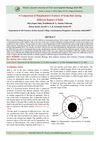 52 citations,
September 2018 in “International Journal of Molecular Sciences”
52 citations,
September 2018 in “International Journal of Molecular Sciences” Ginseng and its compounds may help hair growth and prevent hair loss, but more human trials are needed to confirm this.
 27 citations,
January 2002 in “Exogenous Dermatology”
27 citations,
January 2002 in “Exogenous Dermatology” Chronic exposure to sunlight may worsen male pattern baldness and protecting the scalp from the sun could slow it down.
 December 2022 in “Cosmetics”
December 2022 in “Cosmetics” The food supplement improved hair growth and strength in people with a certain type of hair loss and had no major side effects.
 113 citations,
September 2005 in “Journal of Investigative Dermatology”
113 citations,
September 2005 in “Journal of Investigative Dermatology” Applying a special compound can promote hair growth without harmful side effects.
 January 2023 in “Journal of Cosmetics, Dermatological Sciences and Applications”
January 2023 in “Journal of Cosmetics, Dermatological Sciences and Applications” The hair growth serum Trichosera® was effective in increasing hair regrowth and density and reducing hair fall without significant side effects.
 35 citations,
December 2014 in “Clinical Obstetrics and Gynecology”
35 citations,
December 2014 in “Clinical Obstetrics and Gynecology” Most skin changes during pregnancy go away after giving birth.
 December 2022 in “Kristu Jayanti Journal of Core and Applied Biology (KJCAB)”
December 2022 in “Kristu Jayanti Journal of Core and Applied Biology (KJCAB)” Scalp hair characteristics vary across different regions of India and can help identify a person's origin.
 1 citations,
July 2017 in “Clinical research in dermatology”
1 citations,
July 2017 in “Clinical research in dermatology” Hair loss, known as Androgenetic Alopecia, is often caused by hormones and can be diagnosed using noninvasive techniques. Treatments include topical minoxidil and oral finasteride, with new treatments being explored. There may also be a link between this type of hair loss and heart disease risk.
 2 citations,
November 2019 in “Phytotherapy Research”
2 citations,
November 2019 in “Phytotherapy Research” Pea sprout extract is safe and effectively reduces hair loss.
 9 citations,
September 2018 in “Clinical, Cosmetic and Investigational Dermatology”
9 citations,
September 2018 in “Clinical, Cosmetic and Investigational Dermatology” One supplement improved hair loss and quality faster and more effectively than the other in treating telogen effluvium.
11 citations,
May 2012 in “Genesis” Bmpr2 and Acvr2a receptors are crucial for hair retention and color.
 1 citations,
December 2011
1 citations,
December 2011 Marine-derived ingredients show potential for hair health but need more human trials to confirm effectiveness.
 11 citations,
January 2014 in “The Scientific World Journal”
11 citations,
January 2014 in “The Scientific World Journal” Cynatine HNS improves hair and nail quality in 90 days.
 October 2023 in “Frontiers in medicine”
October 2023 in “Frontiers in medicine” Targeted immunotherapy could be a promising new treatment for hair regrowth.
 37 citations,
May 2016 in “Deutsches Arzteblatt International”
37 citations,
May 2016 in “Deutsches Arzteblatt International” Hair loss requires customized treatments based on its various causes and types.
 21 citations,
July 2014 in “British Journal of Dermatology”
21 citations,
July 2014 in “British Journal of Dermatology” Hair thickness matters more than density for baldness in Japanese men over 25.
 9 citations,
November 2007 in “Veterinary dermatology”
9 citations,
November 2007 in “Veterinary dermatology” Boxer and Labrador dogs' hair growth is affected by the tropical climate, but Schnauzers' is not.
 July 2024 in “ADMET & DMPK”
July 2024 in “ADMET & DMPK” Surface-modified nanostructured lipid carriers can improve hair growth treatments.
 2 citations,
March 2015 in “Hepatitis Monthly”
2 citations,
March 2015 in “Hepatitis Monthly” A woman's hair loss during Hepatitis C treatment with PEG-INF-a-2a and Ribavirin was reversible after stopping the medication.
 December 2023 in “Journal of Cosmetic Dermatology”
December 2023 in “Journal of Cosmetic Dermatology” The hair growth product was effective and safe, increasing hair growth, thickness, and density while reducing hair fall.
 14 citations,
April 2014 in “Medical Clinics of North America”
14 citations,
April 2014 in “Medical Clinics of North America” The document concludes that quick referral and appropriate treatments are crucial for managing common skin conditions and preventing permanent damage.
 11 citations,
April 2020 in “Journal of The American Academy of Dermatology”
11 citations,
April 2020 in “Journal of The American Academy of Dermatology” Microinflammation is more intense in smaller hair follicles and may be linked to hair loss.
 12 citations,
October 2021 in “Cells”
12 citations,
October 2021 in “Cells” Targeting a protein that blocks hair growth with microRNAs could lead to new hair loss treatments, but more research is needed.
 9 citations,
January 2014 in “DARU Journal of Pharmaceutical Sciences”
9 citations,
January 2014 in “DARU Journal of Pharmaceutical Sciences” Cuscuta reflexa extracts helped regrow hair in rats with drug-induced hair loss.
 January 2023 in “European endocrinology”
January 2023 in “European endocrinology” People with alopecia have a higher risk of thyroid cancer.
 25 citations,
June 2020 in “Dermatology practical & conceptual”
25 citations,
June 2020 in “Dermatology practical & conceptual” Scalp cooling can help prevent hair loss from chemotherapy, but treatment should be tailored to the individual and more research is needed.
 35 citations,
May 2012 in “Cochrane Database of Systematic Reviews”
35 citations,
May 2012 in “Cochrane Database of Systematic Reviews” Minoxidil effectively treats female pattern hair loss.
 22 citations,
October 2018 in “Aesthetic Plastic Surgery”
22 citations,
October 2018 in “Aesthetic Plastic Surgery” Understanding hair follicle biology and stem cell control could lead to new hair loss treatments.
 74 citations,
June 2013 in “Journal of Investigative Dermatology”
74 citations,
June 2013 in “Journal of Investigative Dermatology” Four genetic risk spots found for hair loss, with WNT signaling involved and a link to curly hair.
 33 citations,
January 2005 in “Dermatology”
33 citations,
January 2005 in “Dermatology” Trichoscan is a reliable method for measuring hair growth and monitoring treatment effectiveness in hair loss.





























